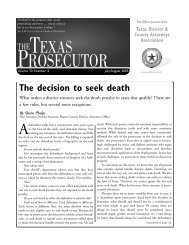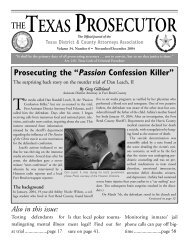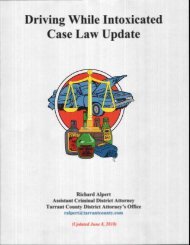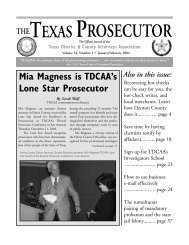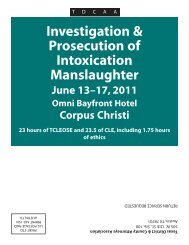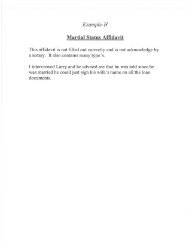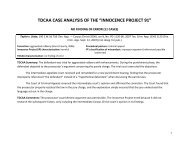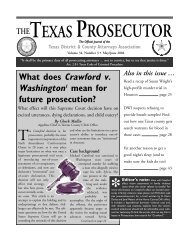Driving While Intoxicated Case Law Update - Texas District ...
Driving While Intoxicated Case Law Update - Texas District ...
Driving While Intoxicated Case Law Update - Texas District ...
Create successful ePaper yourself
Turn your PDF publications into a flip-book with our unique Google optimized e-Paper software.
4) The proponent's need forthe evidence: The Courtthen findsthe State did not have a great need<br />
for this evidence as other evidence showed that officer smelled a strong odor of alcohol on<br />
defendant's breath, defendantwas swaying and told officer he drank a beer;the results of the field<br />
sobriety fesfs shoured sgns of impairment; a videotape at the scene, on which defendant sfafes<br />
he had been drinking beer before the accident; and possibly the resu/fs of the portable breath test<br />
taken at the scene an hour after the accident (which has never been found to be admissible in<br />
court!?) all led the Court to find the State does not have a great need for the blood fesf resulfs.<br />
This factor thus weighs in favor of exclusion. The Court held that blood fesf resu/fs were properly<br />
excluded.<br />
4. EXTRAPOLATION TESTIMONY IS ADMISSIBLE UNDER KELLY, 824<br />
s.w.2D 573 (TEX.CR|M.APP. 1992)<br />
Hartman v. State, 2 S.W.3d 490 (Tex.App.-San Antonio 1999, pet. refd.)<br />
lnteresting to note both these cases involved the testimony of expert George McDougall, Bexar<br />
County Breath Test Technical Supervisor. Mata contains a lengthy dissent by retired Chief Jusfice<br />
Cadena reviewing and challenging the testimony of Mr. McDougall (26 pages!). This dissenf is<br />
worth reading as ff constitutes a kind of treatise (defense oriented) of the problems with retrograde<br />
extrapolation.<br />
5. EXTRAPOLATIONEVIDENCEIMPROPERLYADMITTED<br />
Mata v. State, 46 S.W.3d 902 (Tex.Crim.App. 2001).<br />
Ihis case has senf broad ripples through the state and there has been a great deal of discussion<br />
and disagreement over its meaning and impact on the admissibility of extrapolation evidence. I am<br />
less inclined than others to believe that this opinion has broad and terrible implications. What<br />
follows is a brief review of what I interpret this holding to mean.<br />
The case involves the much touted Sfafe's expert George McDougall who very much impressed<br />
the Court of Appeals in the Hartman case cited above and Court of Appeals opinion of this case.<br />
Ihe lssue b efore the Court of Criminal Appeals is whether the State proved by clear and convincing<br />
evidence that McDougall's retrograde extrapolation was reliable. The Court held that in this case<br />
it was not, and that the testimony should have been excluded. ln arriving at this conclusion, the<br />
Court is careful to point out that it is not saying ertrapolation rs necessary for the State to prove a<br />
defendant guilty in a DWI or to get the results of a breath or blood test before the jury. lt also<br />
explicitly finds that Tetrograde extrapolation" can be reliable in a given case. If a/so sefs what I<br />
believe to be a minimum threshold for the type of factors an expert must be aware of before he can<br />
give such an opinion. Those facts are: the length of time over which the defendant was drinking,<br />
the time of his last drink, and the defendant's weight. Without knowing these factors, I donT believe<br />
it would be proper for an expert for either side fo give an opinion on what the defendant's alcohol<br />
levelwould have been at the time he/she was driving.<br />
86



